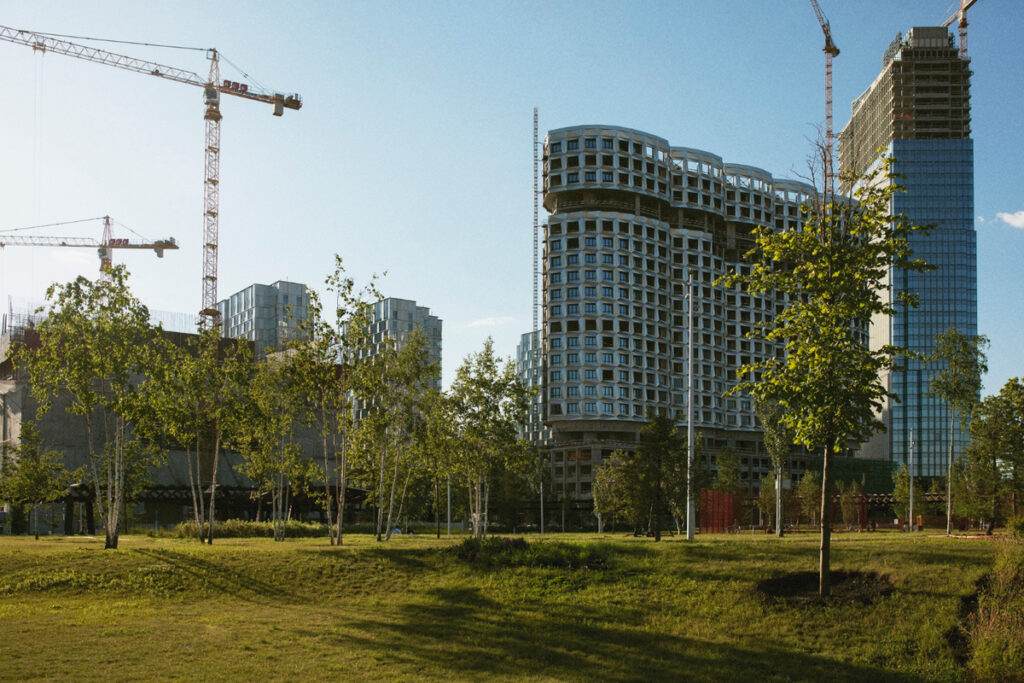Choosing a construction company is a complex decision for any project manager. Construction projects carry high risks – delays can rack up thousands of dollars per day, and safety lapses or code violations can stop work entirely. A wrong hire can lead to “delays, budget overruns, subpar workmanship, and even legal disputes,” so thorough vetting is essential. That means performing due diligence: verifying credentials, financial health, safety practices, and past performance before signing a contract.
Experts note that focusing on key factors – “experience, financial health, project management skills, and communication” – helps set a project up for long-term success. The following tips outline a methodical approach to Selecting the right construction company for both residential and commercial projects, especially when budgets or schedules are tight.
Table of Contents
Tip 1: Evaluate Experience Relevant to Your Project Type
-
Match project scope and scale: A contractor’s portfolio should show experience on projects similar to yours. Commercial buildings (offices, hospitals, malls) often involve steel or concrete structures, multi-phase electrical, and complex MEP systems – quite different from a wood-frame home renovation. Conversely, a contractor who only built small houses may lack the scheduling and compliance know-how for a large commercial job. Look for past projects of comparable size and type and confirm the contractor’s role on each (GC vs. subcontractor).
-
Ask for examples: Request a portfolio or case studies of relevant projects and talk to those clients. One construction guide advises asking for a portfolio of completed projects to judge craftsmanship, deadlines, and code compliance. If a contractor claims big-project experience but only shows small remodels, treat that as a red flag.
-
Spot red flags: The EPA procurement guide warns to watch for warning signs in a firm’s history. These include lawsuits, unresolved disputes, or a “lack of operating projects”. In practice, this means verifying that the construction company contractor actually led projects like yours and didn’t just tag along. If possible, check project records or news for any publicized issues on their past jobs.
-
Compare residential vs. commercial skills: Understand the differences. Residential work often emphasizes aesthetics and quick turnaround, while commercial work demands heavy coordination (with architects, regulators, multiple trades) and strict adherence to accessibility and fire codes. A contractor transitioning from one sector to another may need extra oversight. Confirm they’ve been the responsible general contractor (not just a trade subcontractor) on the type of work you need.
Suggested article to read: Top 101 Construction Company in World; 2024 Review

Tip 2: Check Licensing, Insurance, and Safety Records
-
Licenses and certifications: Ensure the contractor holds all required licenses for your jurisdiction (state or local GC licenses, and trade licenses for specialties). Most states have online lookup tools. For example, Washington State’s L&I site lets you verify that a business has an active contractor registration and paid workers’ comp coverage. Ask if the firm’s staff have relevant credentials (OSHA safety training, LEED, PMP, etc.) as evidence of professionalism.
-
Insurance coverage: The contractor should carry General Liability and Workers’ Compensation insurance at minimum. General liability covers third-party bodily injury or property damage (e.g. a visitor hurt on site), while workers’ comp covers employee injuries. Request certificates of insurance to confirm coverage limits and expiration dates. If you’re using public funds or large contracts, verify that required performance/payment bonds are in place; a construction company contractor’s bonding ability is another check on financial strength.
-
Safety record: A strong safety record correlates with on-time, on-budget delivery. One industry source notes contractors with excellent safety records are “much more likely to get the job done on time and on budget, and without safety citations that can… delay projects indefinitely”. Ask for the Experience Modification Rate (EMR) and OSHA history; an EMR below 1.0 means fewer incidents than average. High incident rates or frequent OSHA fines are major red flags. Use official tools to check for safety violations – many state sites (like WA L&I) allow you to search if a contractor has citations or even lawsuits against its bond.
-
Legal and reputational risk: Hiring a construction company that is unlicensed, uninsured, or has poor safety practices exposes you to legal liability and project shutdowns. Ensure compliance: firms caught without insurance or licenses can face stop-work orders or big fines, and any OSHA shutdown or citation can halt your schedule. In short, don’t proceed with a contractor who can’t show up-to-date license and insurance documentation.
Tip 3: Review Financial Stability and Contracting Capacity
-
Cash flow and credit: Confirm the contractor has the financial resources to carry your project through completion. Good indicators include healthy liquidity, lines of credit, or positive reviews from lenders or suppliers. A construction company chronically short on cash may delay payments to subcontractors or material suppliers, causing work stoppages.
-
Bonding capacity: Surety bonds protect the owner if a contractor defaults. A high bonding capacity means underwriters trust the contractor’s financial health. In fact, surety companies rigorously vet a contractor’s finances and track record before issuing a bond. Baldwin & Lyons note that sureties evaluate the contractor’s financial stability and past performance – firms with strong credit and a history of finishing projects on time get better bond terms. If a contractor can’t post sufficient bonds for the project size, that indicates limits on their capacity.
-
Supply chain relationships: Ask about the contractor’s relationships with key suppliers and subcontractors. A well-established contractor will have negotiated terms or agreements in place for bulk purchases or priority scheduling. Check if they’ve had recent disputes with vendors or liens on past jobs. Poor supplier credit can slow procurement of critical materials.
-
Examples of risk: History repeats itself. A cautionary example: when one general contractor filed Chapter 7 bankruptcy, two $10M+ public projects in West Virginia sat idle until the bonding company intervened. Municipal managers had to wait for bond releases and new bids just to restart construction. This illustrates how a contractor’s collapse can “hold hostage” a project. Use such examples to stress-test your candidate: ask about any project delays or defaults in recent history.

Tip 4: Analyze Project Management and Communication Systems
– Scheduling and cost control: Review the contractor’s planning process. Do they produce a Critical Path Method schedule (using MS Project, Primavera P6, or similar) and update it regularly? Robust scheduling and budgeting procedures are vital. For example, one source notes that an average construction project generates ~10–15 RFIs per $1M of value, and unresolved RFIs on a $5M job could add roughly $100K in costs. Ask how quickly they typically close RFIs or change orders, and how they mitigate scope creep and cost overruns. Prompt, transparent handling of RFIs and change requests signals disciplined management.
-
Coordination meetings: Effective communication on-site is crucial. Leading construction companys hold weekly coordination meetings with all trades to catch clashes and align progress. Indeed, industry data shows undetected design conflicts can cost about 5% of a project’s budget, all of which can be avoided through thorough coordination. Ask if the contractor runs regular trade-partner meetings, uses clash-detection (especially on BIM projects), and has a protocol for action-item tracking.
-
Use of technology: Evaluate what tools the contractor uses to communicate. Modern construction firms often use platforms like Procore, PlanGrid, Autodesk BIM 360 or similar to share drawings, RFIs, daily logs, and updates in real time. Confirm whether you (the owner) will have access to project reports or dashboards. If the contractor relies only on paper or loose spreadsheets, that’s a warning sign in today’s industry.
-
Documentation practices: Check their document control standards. A good contractor will maintain organized logs of submittals, RFIs, permits, and change orders. Ask for examples of past meeting minutes or progress reports. They should have a defined process for updating the schedule and budget (e.g. weekly progress updates with earned-value tracking). Slow RFI turnaround or missing documentation can indicate weaker project management. Ensure there will be a single point of contact (project manager or superintendent) and a communication plan so you always know who to ask for information.
Tip 5: Assess References and Track Record of Delivering on Time
-
Ask structured questions: Contact several recent clients (ideally on similar project types). Don’t just ask if they’d recommend the contractor – ask specific questions. For example: Did the project adhere to the agreed-upon schedule and budget? If not, what were the reasons? and Was the contractor consistent in meeting deadlines?. These pointed questions (drawn from builder recommendations) help reveal patterns: chronic delays, communication issues, or cost surprises will become obvious.
-
Verify timelines: Cross-check reference feedback with records. Compare promised vs. actual completion dates, and look for any reported delays. You can check permit final dates or news articles for the closing of high-profile projects. A track record of missing deadlines, even for legitimate reasons (weather claims, etc.), should be a caution flag.

-
Evaluate change order history: Ask about the number and cost of change orders on past projects. A higher-than-expected volume of changes might indicate poor initial planning or scope definition. References should tell you if change orders were mostly due to true owner-requested extras or contractor oversights.
-
Overall reputation: Finally, get a sense of the contractor’s work quality, communication and professionalism. Were job sites kept clean? Did the contractor respond promptly to concerns? People often remember if the crew was courteous and if problems were resolved fairly. Unprompted praise (or criticism) in reference calls is very telling. Also consider checking online reviews or industry platforms (e.g. Dodge Reports) for any recurring complaints.
FAQs
How can you ensure you’re choosing a construction company with the right experience?
Compare your project’s scope to the contractor’s past work. Review their portfolio and ask specifically for completed projects of a similar type and size. During interviews, ask how they managed those projects and what role they played. Speaking directly with those past clients can confirm that the contractor truly understands the unique requirements of your project’s category.
What documentation should be verified when choosing a construction company for your project?
Always check for up-to-date licenses and insurance certificates. Verify their contractor license through your state’s licensing board or consumer protection site. Obtain a certificate of general liability insurance (covering property damage and injury) and proof of workers’ compensation coverage for any employees. If required by the contract, confirm the contractor has performance and payment bonds in place as well. These documents protect you legally and financially if something goes wrong.
Which project management practices indicate a well-organized contractor when choosing a construction company?
Look for systematic scheduling and communication processes. A well-organized construction company will use tools (like Procore, MS Project, or BIM) to track tasks and issues. They should hold regular coordination meetings with trade partners, maintain RFI and submittal logs, and provide you with frequent progress updates. Ask if they have a designated project manager and how they report on budget and timeline (for example, weekly written reports or dashboard access). Prompt RFI responses and clear documentation are good signs of strong management.
Is it true that checking references is mandatory when choosing a construction company?
While not legally mandatory, checking references is a best practice that experienced project managers never skip. References – ideally past clients or architects – can verify if the contractor truly delivers on schedule and budget. They also reveal if any major issues arose (and how the contractor handled them). Skipping reference checks means missing out on this valuable insight. In short, yes – for peace of mind and risk reduction, you should always contact references before finalizing a contractor.
Conclusion
Choosing a construction company is not a decision to be rushed. Each of these vetting steps – from confirming relevant experience and licenses, to checking financial strength, safety, and project management capabilities – builds confidence that your project will run smoothly. A methodical approach reduces surprises, especially under tight budgets or schedules. In the end, the right contractor becomes a partner in achieving project goals. By carefully verifying experience, compliance, communication, and references, a project manager sets the stage for a successful build from start to finish.
Resources:
-
Baker Group. (2019). Why Your Contractor’s Safety Rating Matters.
-
Washington State Department of Labor & Industries. (n.d.). Verify a Contractor, Tradesperson or Business.
-
Baldwin & Lyons, LLC. (2023). What Are Surety Bonds & Why are They Important in Construction?
-
Procore Technologies, Inc. (2025). RFIs: A Contractor’s Guide to Requests for Information.
-
Autodesk Construction Cloud. (2022). 10 Tips for Running Effective Coordination Meetings.
For all the pictures: Freepik
Suggested article for reading:
Architecture University 2025: Top Programs Embracing Sustainability and Smart Tech
7 Real-World Applications of Concrete Sensors in Smart Construction Projects
The Future of Site Security: Emerging Trends in Alarm System Technology
Top 7 Modern Architecture Trends Shaping 2025: From Minimalism to Smart Homes
5 Essential Features to Look for in Site Security Alarm Systems





